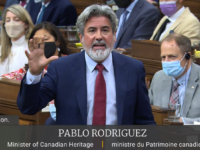Canadian Heritage Minister Pablo Rodriguez has insisted for months that Bill C-18, the Online News Act, is a market-based approach that would leave it to the Internet platforms and Canadian media outlets to negotiate deals based on the principle of mandated payments for links. Faced with the prospect of Meta and Google’s recent announcements that they would block news links in order to comply with the legislation, it would appear that the government has caved on the bill as it searches for a face-saving compromise. Rodriguez and Prime Minister Trudeau had tough talk last week, but behind the scenes they were seemingly ready to cast aside the core principles that they claimed were essential to the legislation.
Blog
Ask Rodriguez Anything: My Ten Questions for Heritage Minister Pablo Rodriguez on Bill C-18
Canadian Heritage Minister Pablo Rodriguez has scheduled a press conference for later today to answer questions on the legislative mess that is Bill C-18. With Meta and Google announcing that they will block news sharing and links on their platforms before the law takes effect, the Canadian media sector stands to lose millions of dollars with lost links, the cancellation of dozens of existing deals, and a bill that might not generate any new revenues. Rodriguez has been flailing for a response in recent days with mounting doubts about the government’s strategy and its seeming failure to anticipate this reaction. He will be joined by MPs from the NDP and Bloc, who were supportive of the legislation during the committee process and joined forces to cut off debate and defeat potential amendments that would have address the concerns regarding mandated payments for linking. There are no shortage of questions that require answering and I’ve identified my ten on Bill C-18 below.
Process Failures: What the Raptors Losing Fred VanVleet Teaches About Bill C-18
Evan Scrimshaw, who writes an engaging Substack primarily focused on Canadian politics, posted an interesting piece over the holiday weekend that linked the Toronto Raptors failure to resign guard Fred VanVleet and the reaction to Google and Facebook’s announcement that they plan to block news sharing or links as a result of Bill C-18. Scrimshaw argues that the public commentary on both developments featured similar “I told you so’s”: those that argue the Raptors should have traded VanVleet at the trade deadline rather than risk losing him for nothing and those who now argue that Bill C-18 would invariably lead to Google and Facebook blocking news sharing or links. Scrimshaw makes the case that it is too early to conclude anything with respect to Bill C-18 and that the Internet companies and government are merely engaged in a very public negotiation that could well result in either or both seeking a compromise before the law takes effect.











